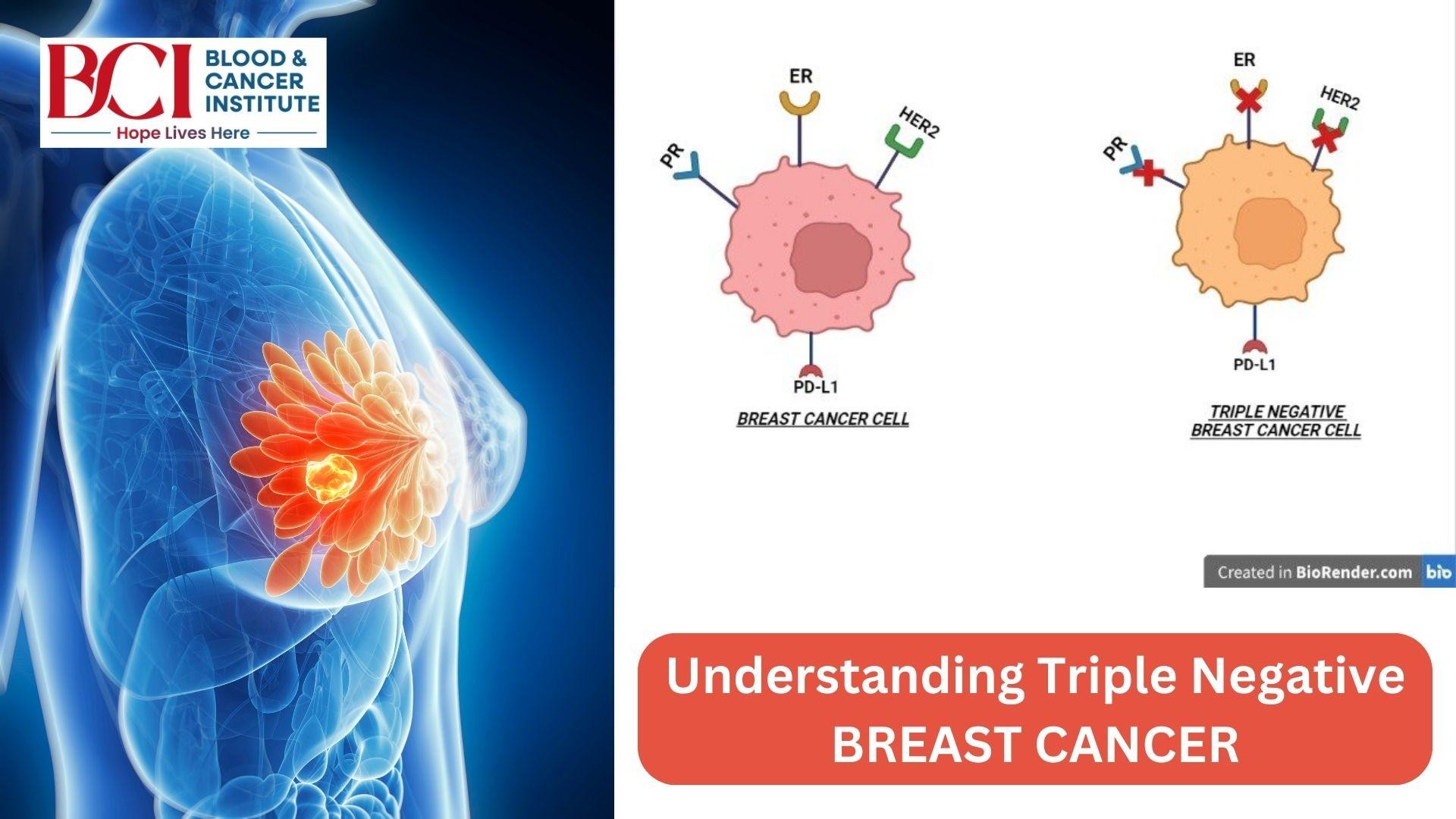
- By : BCI
- Blog
- Comments: 0
Understanding Triple-Negative Breast Cancer: Diagnosis and Treatment
Triple-negative breast cancer (TNBC) is an aggressive form of breast cancer that accounts for about 10–15% of all breast cancer cases. Unlike other types of breast cancer, TNBC lacks the three key receptors — estrogen, progesterone, and HER2 — commonly targeted by many cancer treatments. This unique profile makes TNBC more challenging to treat, but advances in research and treatment options continue to improve outcomes for patients. In this blog post, we’ll explore what triple-negative breast cancer is from our breast cancer specialists in Surat at BCI- Blood and Cancer Institute, how it’s diagnosed, and the available treatment options.
What Is Triple-Negative Breast Cancer?
Triple-negative breast cancer is named for its absence of three receptors:
- Estrogen receptors (ER)
- Progesterone receptors (PR)
- Human epidermal growth factor receptor 2 (HER2)
In many breast cancers, these receptors fuel tumor growth and are often the target of treatments like hormone therapy or HER2-targeted drugs. Without these receptors, TNBC does not respond to these therapies, which is why alternative treatment strategies are necessary, explain the best cancer specialists in Surat.
TNBC tends to grow and spread more quickly than other types of breast cancer. It is also more likely to recur after treatment, especially in the first few years. Despite its aggressive nature, TNBC is treatable, particularly when detected early.
Who Is at Risk for Triple-Negative Breast Cancer?
Some groups of people face a higher risk of developing TNBC:
● Younger individuals: TNBC is more common in women under the age of 50.
● African American and Hispanic women: Studies show that TNBC occurs more frequently in these populations.
● People with BRCA1 gene mutations: Those with inherited BRCA1 mutations have an increased likelihood of developing TNBC.
● Family history: A strong family history of breast or ovarian cancer may also raise the risk.
Understanding your risk factors can help you and your doctor create a plan for regular screenings and early detection.
How Is Triple-Negative Breast Cancer Diagnosed?
Diagnosing TNBC follows the same initial process as other types of breast cancer.
- Breast Examination: A lump, abnormality, or changes in the breast may prompt further testing.
- Imaging Tests: Mammograms, ultrasounds, or MRIs provide detailed images of the breast to identify suspicious areas.
- Biopsy: A biopsy involves removing a small sample of tissue from the breast for laboratory testing.
Once cancer is confirmed, the biopsy sample is tested for the presence of ER, PR, and HER2 receptors. If the results are negative for all three, a diagnosis of triple-negative breast cancer is made.
After the diagnosis, doctors typically perform additional tests to determine the stage of the cancer and whether it has spread to other parts of the body. This information is critical for developing a treatment plan.
Treatment Options for Triple-Negative Breast Cancer
While TNBC doesn’t respond to hormone therapy or HER2-targeted drugs, several effective treatment options are available, advised by the doctors from the best cancer hospital in Surat — BCI Hospital.
1. Chemotherapy
Chemotherapy remains the cornerstone of treatment for TNBC. It works by destroying rapidly dividing cancer cells, making it particularly effective for this fast-growing cancer.
● Neoadjuvant chemotherapy is given before surgery to shrink the tumor, making it easier to remove.
● Adjuvant chemotherapy is administered after surgery to kill any remaining cancer cells and reduce the risk of recurrence.
Chemotherapy has been shown to improve survival rates in many TNBC patients.
2. Surgery
Surgery is typically performed to remove the tumor. The type of surgery depends on the size and location of the tumor:
● Lumpectomy: Removes the tumor and a small margin of surrounding tissue.
● Mastectomy: Removes the entire breast, and in some cases, nearby lymph nodes.
Your doctor will recommend the best surgical approach based on your specific condition.
3. Radiation Therapy
Radiation therapy uses high-energy rays to target and destroy cancer cells. It is often used after surgery to eliminate any cancer cells that may remain in the breast or nearby lymph nodes.
4. Immunotherapy
Immunotherapy is an exciting development in the treatment of TNBC. Drugs like immune checkpoint inhibitors help the body’s immune system recognize and attack cancer cells. Immunotherapy is often combined with chemotherapy to enhance its effectiveness.
5. Targeted Therapies
Recent research has led to the development of targeted therapies specifically for TNBC. One such treatment is the use of PARP inhibitors, which are particularly effective in patients with BRCA mutations. These drugs interfere with cancer cells’ ability to repair DNA, causing them to die.
Living with Triple-Negative Breast Cancer
A diagnosis of TNBC can feel overwhelming, but many people successfully manage the disease and live full lives. Here are a few tips to help:
● Build a Support System: Surround yourself with friends, family, and healthcare providers who can offer support.
● Stay Informed: Learn as much as you can about your diagnosis and treatment options.
● Adopt a Healthy Lifestyle: Eating well, staying active, and managing stress can improve your overall well-being during treatment.
● Attend Follow-Up Care: Regular check-ups are essential to monitor for recurrence and manage side effects.
Conclusion
Triple-negative breast cancer is a complex and aggressive form of cancer, but advances in diagnosis and treatment are making a difference. Early detection with the best cancer treatment in Surat can significantly improve outcomes, so regular screenings and awareness of your risk factors are critical.
If you or a loved one is facing TNBC, know that you are not alone. With the right care, support, and treatment plan, many people overcome this challenging diagnosis and thrive.
